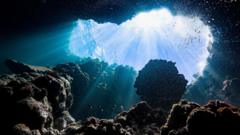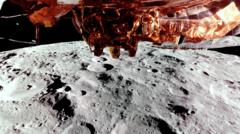A groundbreaking mission to study the deep seabed's 'dark oxygen' production could influence our understanding of extraterrestrial life. As researchers uncover the potential for oxygen creation in total darkness, they grapple with the implications for seabed mining activities and marine ecosystems.
"Exploring 'Dark Oxygen': A New Perspective on Life Beyond Earth"

"Exploring 'Dark Oxygen': A New Perspective on Life Beyond Earth"
Researchers are delving into the possibility of oxygen production in Earth's deep oceans, aiming to redefine the parameters of life on other planets.
Scientists have recently unveiled plans to explore the deep ocean floors of Earth in search of a previously overlooked phenomenon they call "dark oxygen." This new investigation stems from their initial revelation that certain metal lumps, or nodules, located on the dark ocean seabed, were generating oxygen, seemingly upending longstanding beliefs about oxygen production exclusively via photosynthesis in sunlight.
According to lead researcher Prof Andrew Sweetman, this discovery could fundamentally reshape our perception of life potential on distant planets. "We are currently collaborating with experts from NASA, who contend that such dark oxygen production might influence our understanding of how life can persist in environments devoid of sunlight," he explained.
The mission would involve probes to areas at depths exceeding 10 kilometers (6.2 miles), utilizing remotely operated submersibles equipped with advanced sensing technology. "Our confidence in replicating these findings elsewhere is strong, and we're eager to uncover the specific mechanisms at play," said Prof Sweetman.
The origins of this scientific inquiry date back to last year when findings published in *Nature Geoscience* initiated a heated debate within the scientific community. The initial study was conducted in a region between Hawaii and Mexico. Sensors deployed by the researchers revealed unexpected increases in oxygen levels at depths around 5 kilometers (3.1 miles), prompting doubts and criticisms from some scientists and deep-sea mining companies concerned about the impact on potential mining activities of these metallic resources.
The controversy has grown as seabed mining firms plan to harvest these metals, deemed crucial for battery production in electric vehicles and other technologies, from habitats that are not well understood. Critics of the original findings, like Michael Clarke from a Canadian deep-sea mining company, highlighted a lack of methodological rigor, alleging that the oxygen readings could be attributed to bubbles generated during sample collection.
In response, Prof Sweetman clarified their findings, adamantly dismissing these critiques and asserting that forthcoming experiments would provide definitive evidence about the process of oxygen generation in the seabed nodules.
As the nexus of scientific discovery and commercial interest intensifies, over 900 marine scientists from around the globe have petitioned for a moratorium on seabed mining activities, prioritizing extensive research on deep-sea ecosystems. Prof Sweetman emphasized the need for caution, saying, "Before any decisions are made, we must comprehensively understand these ecosystems," advocating for a careful deliberation on the future of seabed extraction as a collective societal responsibility.

















